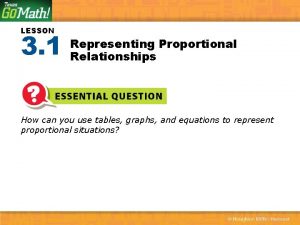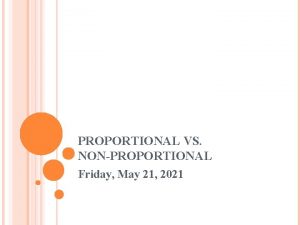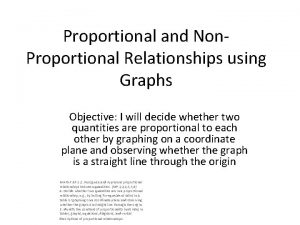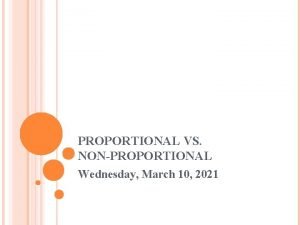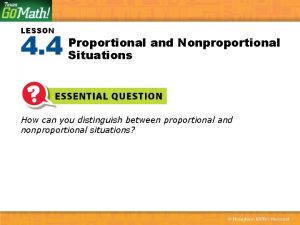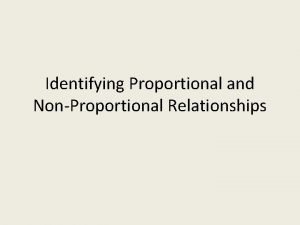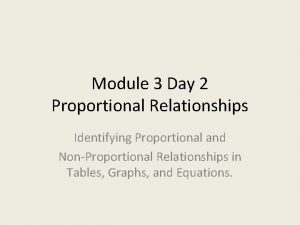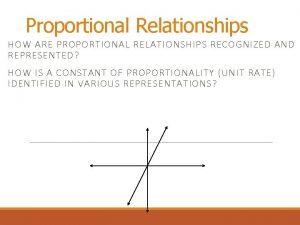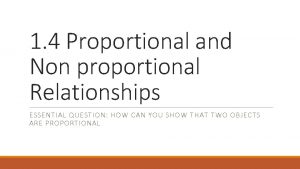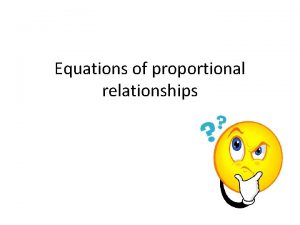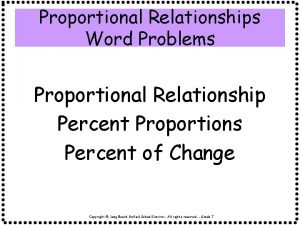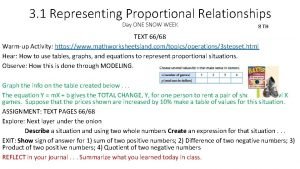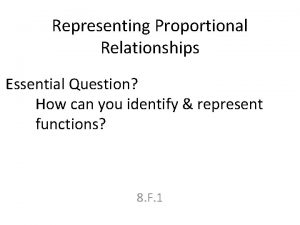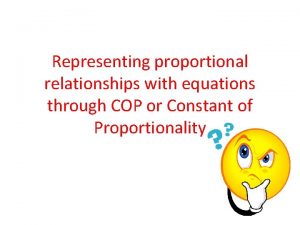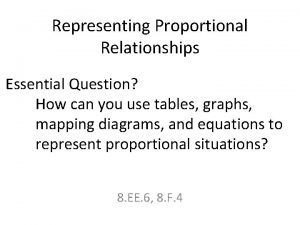Identifying and Representing Proportional Relationships Discovering Proportional Relationships




















- Slides: 20

Identifying and Representing Proportional Relationships

Discovering Proportional Relationships • A giant tortoise moves at a slow but steady pace. It takes the giant tortoise 3 seconds to travel 10. 5 inches. – How far does the tortoise travel in 1 second? – Suppose the tortoise travels 12 seconds. How could you find the distance the tortoise travels?

Important Terms • Rate of Change: is a rate that describes how one quantity changes in relation to another quantity. • Proportional Relationship: a relationship in which the rate of change is constant.

Important Terms • Proportion: a statement that two rates or ratios are equivalent. • Constant of Proportionality (k): The ratio of the two quantities or y=kx – Must be multiplied by a constant amount to get your output.

Finding the Constant of Proportionality • To find k you must divide the y value by the x value.

Finding the Constant of Proportionality Ex. 1 Hours Worked (x) 1 2 3 4 Total Earnings (y) $7. 50 $15. 00 $22. 50 $30 • Determine the constant of proportionality.

Finding the Constant of Proportionality Ex. 2 People (x) 3 5 7 9 Slices of Pizza (y) 9 15 21 27 • Determine the constant of proportionality.

Finding the Constant of Proportionality Ex. 3 Cookies (x) 2 3 4 5 Price (y) $1. 00 $1. 50 $2. 00 $2. 50 • Determine the constant of proportionality.

Finding the Constant of Proportionality Ex. 4 People (x) 5 6 7 8 Slices of Pizza (y) 17. 5 21 24. 5 28 • Determine the constant of proportionality.

Proportional or Not? Input (x) 1 2 3 4 Output (y) 2 4 6 8 • Is the table above showing a proportional relationship? If it is, what is the constant of proportionality.

Proportional or Not? Input (x) 3 4 5 6 Output (y) 18 24 30 34 • Is the table above showing a proportional relationship? If it is, what is the constant of proportionality.

Proportional or Not? Input (x) 2 3 4 5 Output (y) 3. 5 5. 25 7 8. 75 • Is the table above showing a proportional relationship? If it is, what is the constant of proportionality.

Proportional or Not? Input (x) 1 2 3 4 Output (y) 6. 3 12. 6 18. 6 25. 2 • Is the table above showing a proportional relationship? If it is, what is the constant of proportionality.

Proportional or Not? - Graphs • Two conditions: –Must pass through the origin –Must be a straight line

Finding the Constant of Proportionality on a Graph 30 25 20 15 10 5 0 0 1 2 Find the y value for x = 1. 3 4 5 6

Which of the following graphs show direct variation (proportional relationship)?

Graph and find k. Input (x) 1 2 3 4 Output (y) 1. 5 3 4. 5 6

Determining Proportional Relationships by the Equations •

Determining Proportional Relationships by the Equations •

 3-1 representing proportional relationships
3-1 representing proportional relationships What is a proportional relationship
What is a proportional relationship Proportional vs non-proportional
Proportional vs non-proportional Lesson 6.1 representing functions answer key
Lesson 6.1 representing functions answer key Identifying and non identifying adjective clauses
Identifying and non identifying adjective clauses Identifying and non identifying adjective clauses
Identifying and non identifying adjective clauses Information essential
Information essential Non-proportional graph
Non-proportional graph Inveresly
Inveresly Proportional table example
Proportional table example Proportional graphs worksheet
Proportional graphs worksheet Boyle's law direct or indirect
Boyle's law direct or indirect What makes two quantities proportional
What makes two quantities proportional Proportional and nonproportional relationships lesson 4
Proportional and nonproportional relationships lesson 4 Proportional and nonproportional relationships answer key
Proportional and nonproportional relationships answer key Lesson 4 proportional and nonproportional relationships
Lesson 4 proportional and nonproportional relationships Ethics discovering right and wrong
Ethics discovering right and wrong To find the height h of a dinosaur in a museum
To find the height h of a dinosaur in a museum Stoichiometry island diagram
Stoichiometry island diagram Graph proportional
Graph proportional Lesson 7-5 using proportional relationships answers
Lesson 7-5 using proportional relationships answers
